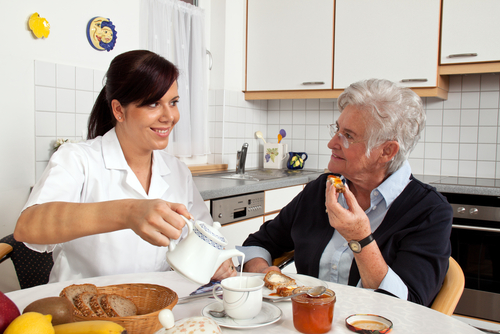In this issue...
Don’t let harsh sun ruin your summer fun
What services should you expect to receive from a home health aide?
Be ready…could be a bad year for ticks
|
What services should you expect to receive from a home health aide?

It can happen at any time. One day your parent or elderly loved one is going about life as usual in their own home and doing well. The next day, they can be in the hospital with a broken hip or other physical ailment.
Then, the dilemma begins. How do you look after your parent while you still work full-time, have a family to take care of, and are not in good health yourself?
This scenario is not uncommon and in fact, occurs on a daily basis. As children of aging parents, we are sometimes caught between taking care of an active family and the parent-often called the sandwich generation.
Home care has become a viable resource in caring for senior loved ones. Today, with current technology, medical professionals, and home resources, seniors can return to their homes for rehab and re-training, and the families can enjoy peace of mind knowing that mom or dad is comfortable and being cared for in an environment that he/she has always known and feels good about. One way that Nightingale offers care is by employing home health aides. Professional aides are important when mom/dad needs extra assistance to get back on track after a trauma. Medical assistants do just that-they lend assistance and provide an invaluable service for the patient after, before, or during visits from the skilled professionals such as therapists, and nurses.
Some of the services that you should expect to receive from a health care aide through a home care provider include:
- Provide or assist with patient's personal care including but not limited to: bathing, shampooing hair, oral hygiene, and general skin care. Assists patients with dressing or grooming.
- Assist patients/clients with mobility and ambulation. Examples may include, transfers, assistance with walker use, etc.
- Prepare and serve meals. May feed patients and/or provide fluids, as directed in the Plan of Care.
- Assist patients/client with toileting activities including the use of a bedpan, commode, or toilet; or changing diapers.
- Take and record oral, rectal and auxiliary temperatures, pulse and respiration and/or blood pressure.
- Turn and position bed-bound patients, and provide preventive skin care techniques including backrubs and other measures.
- Perform range of motion and other simple procedures as instructed by and under the supervision of the therapist or nurse.
- Assist patient/client in the self-administration of medication. Home Health Aides do not administer medicine but assist the patient/client.
- Perform household tasks including but not limited to: changing bed linen, washing dishes, vacuuming and dust-mopping floors, dusting furniture, grocery shopping, emptying trash, etc.
- Report observations in a timely manner to the RN Case Manager to bring nursing attention to patient changes or other urgent needs. Documentation of observations and duties.
- Uses personal protective equipment when completing tasks where contact with blood or body fluids is a possibility.
- Involve patient/client in socialization or other diversions to promote activity of the mind and self-esteem.
|

